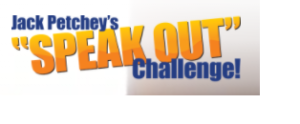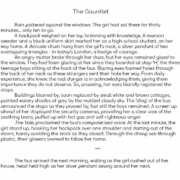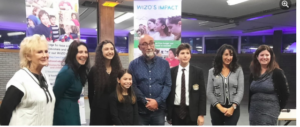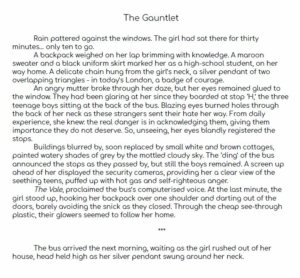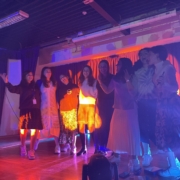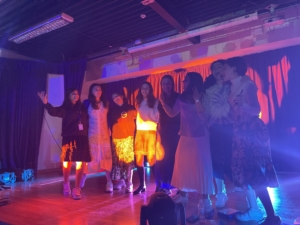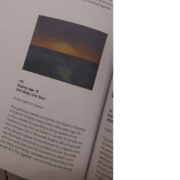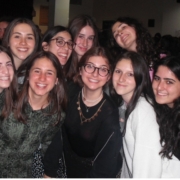The Erev Yom Kippur Yom Iyun was short, yet perfectly formed.
HIPE ran a fun, informative and interactive session with Years 7-9. They explored the three key concepts of Tefilla, Teshuva and Tzedaka. These words are repeated throughout the day, they are both simple and profound and unlock the intricacies of the Yom Kippur Tephilla. They looked at everyday habits, which can be so hard to break, and linked this to the concept of Teshuva. The students were asked to write down aspects of their lives that they could improve upon, ranging from the general ‘ME’ to the more specific ‘to be more careful about how I say Shema’. The third task was to choose a time frame to take on the new habit, such as ‘Once a week I will really focus on my Shema’. This was written on its own small notecard.
Moving onto Tephilla, HIPE presented two options: all the girls agreed that it was unfair that if one person was late to class, the whole class should have detention; most also agreed that if a few girls did well, everyone could have an ice cream party! This suggests that we do want to be a part of a community so we can benefit from the good that so many do. Hence the fact that the language of Tephilla on Yom Kippur is in the plural. To create a practical approach to this, each student was given a bookmark with the words ‘One who davens for another…will himself first be answered.’ On the reverse was a name of another student. Going forward, this markers, in the siddur of each student could focus their Tephilla on another student.
The activity continued with each student tying her notecard to a biodegradable balloon, to be released outside. Rabbi Fachler explained that human beings are the only creation who can look up. We look up to Hashem when we are in trouble, and we look up when we are full of joy. With that, hundreds of pink and yellow balloons were joyfully released.
Parts of the programme were run by the JS staff who explored the theme of appreciating Yom Kippur as a day of opportunity to change and start the new year with a clean slate. The students explored the obstacles to meaningful change based on the writings of Rabbi Dr Avraham Twersky and spoke about how to overcome negative labels that we have placed on ourselves. The session finished with the students filling cards to put in their Machzor with their hopes and prayers for the year ahead.
Years 10 and 11 also heard Rabbi Peretz Goldstein, of SEED in Borehamwood. He wove in a great range of personal anecdotes to show the girls that Judaism is a religion of love. Even though we argue with our friends and family, we do all love each other. Even though we may ‘argue’ with Hashem, He still loves us. He is ‘Avinu Av HaRachaman’; our Father who loves us. However, why is He ‘Avinu’ and not ‘Imenu’- our Mother? The comparison Rabbi Goldstein brought was from a Holocaust story, where mothers had to choose which child to save. A mother’s love is individually focussed on each child, whereas a father’s love is less targeted. We want a father’s love on Yom Kippur as it is unconditional. Yet, we must also fear a father in a way that we do not fear a mother.
He developed the concept of Teshuva by breaking it down into small chunks, using the idea that ‘big ideas define little people and little ideas define big people.’ Start small. Each small step in personal change create huge growth in a person.
The Sixth Form were privileged to hear a very special speaker, Mrs Chavi Teller. Immediately after giving birth, Chavi was placed in an induced coma with Covid-19 pneumonia. They heard the story of her life-changing recovery and why the hospital staff nicknamed her “the miracle lady.”
Thank you to Rabbi Bennett, the HIPE and all the JS staff who created this inspirational programme, taking the girls into Yom Kippur in a way which will empower their Tephilla.


